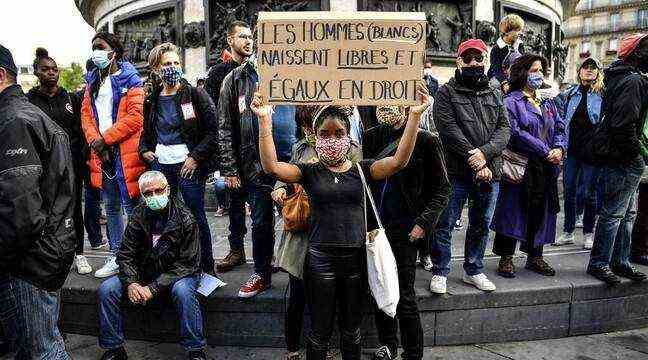This citizen consultation should last two months. – Christophe ARCHAMBAULT / AFP
- The launch of this “citizen consultation on discrimination” comes after the creation of a platform inaugurated in February and managed by the Defender of Rights to support victims.
- For two months, citizens will be able to assess measures to combat discrimination and make their own proposals.
- These contributions will feed into the future national plan to combat racism, anti-Semitism, homophobia and xenophobia, which must be presented before the summer.
Emmanuel Macron had promised it last December. Interviewed by the online media Brut after the wave of indignation caused by the aggression of Michel Zecler by several police officers, the Head of State announced the establishment of a “large survey” on discrimination. Four months later, it is not a survey but a
“Citizen consultation” which was finally launched this Thursday by the ministers in charge of piloting this project, Elisabeth Moreno and Marc Fesneau.
Complementing the reporting platform managed by the Defender of Rights since last February, this digital consultation should collect contributions from French women and men around eight predefined themes. “I want everyone to participate […]. There will be no taboo subject, all situations of discrimination will be put on the table, ”assured the Minister Delegate in charge of Gender Equality and Diversity on Thursday morning.
Make the subject exist
Access to housing, leisure, health care, employment, public services, insurance, banks, mutual funds or security …Internet users will be able to vote for the best proposals to fight against discrimination. Association actors, businesses and individuals alike can also formulate their own proposals. For the president of the SOS racism association, this initiative has the merit “of showing that the subject exists”: “Racial discrimination has long been denied by political leaders. This consultation signals the return of this theme in the public debate ”, welcomes Dominique Sopo.
Scheduled to last two months, the investigation will be summarized in a report submitted to the Prime Minister at the end of May, said Elisabeth Moreno. Some proposals will also feed into the next National Plan to Combat Racism, Anti-Semitism, Xenophobia and Homophobia, which must be presented before the summer.
On the other hand, the prospect of legislative reform or a strengthening of the legal arsenal seems unlikely. “I’m not ruling out anything at this point, but it you have to be realistic about the parliamentary calendar, ”pointed out the Minister Delegate. And to add: “A law is not everything and our legal arsenal is already important. “. An argument that does not convince Dominique Sopo: “The government was able to bring out a bill to strengthen respect for the principles of the Republic. Why, on the subject of discrimination, which is fundamental, could we not find the time to vote on a text? “
Any tracks already known?
Some also fear that proposals that are too “consensual” will emerge. “The new solutions proposed by the government on the site and put to the vote of the citizens are extremely vague and will generate a tidal wave of approval. The tools to fight against discrimination, more politically sensitive, are not provided, ”points out Jean-François Amadieu, professor at the University of Paris-I and director of the Observatory of Discrimination.
In the tab dedicated to security, we find, for example, measures provided for by the future law on global security, such as the extension of the device of pedestrian cameras. On the other hand, the establishment of a “receipt” during identity checks by the police, yet suggested for a decade by anti-racist associations, has not yet been proposed.
As for the information resources made available to Internet users to express their views on these subjects, they are deemed “insufficient” by Jean-François Amadieu: “We ask citizens to assess the most effective tools and techniques to fight against all discrimination. It’s a bit of a joke. We have accumulated decades of scientific studies on the subject, we could already capitalize on what we know and what works abroad. “
And the president of SOS Racisme recalls: “After the demonstrations provoked by the Zecler affair, we sent 26 proposals to Emmanuel Macron on discrimination. At the highest level of the State, there is therefore a perfect knowledge of the proposals made by the associations. “

